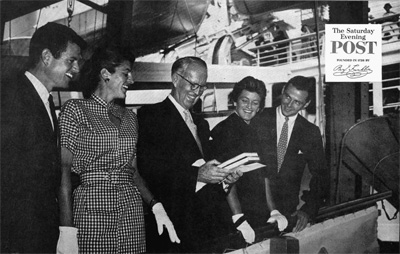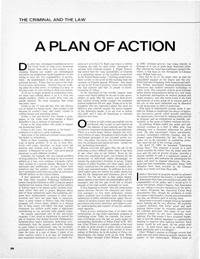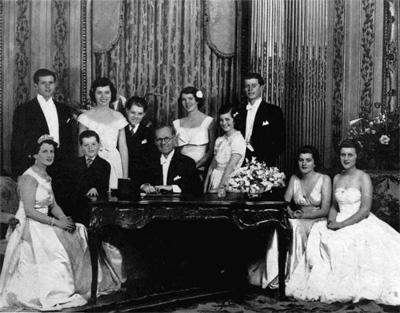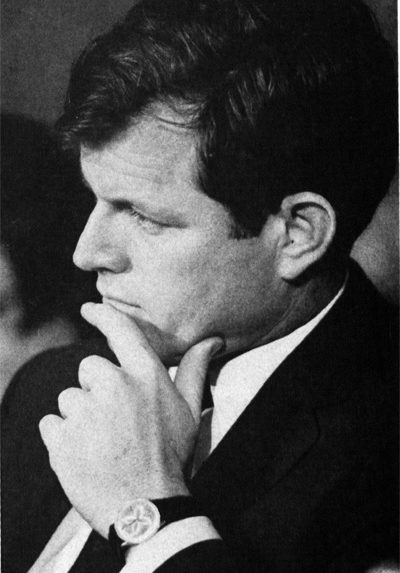When Edward M. Kennedy won Massachusetts’ senatorial race in 1962, one of his brothers was the U.S. Attorney General and the other was president. At the time, his opponents discounted Edward’s success, claiming he only won because of family connections. The Post, which would never be accused of supporting Edward Kennedy, was unusually snide about his first senate victory.
“Well, Teddy won the Democratic nomination for the Senate, and we suppose that is all that matters in many minds. The voters of Massachusetts, to paraphrase a close relative of Teddy’s, have made their judgment, and who can question the wisdom of the Democratic voters? Let us now close ranks, rally round the flag, remember Pearl Harbor and accept the verdict of the highest judge. As far as we are concerned, the voters of Massachusetts made a mistake. They picked a charming, handsome, golden-voice youngster with a name—a man who is unqualified for such an exalted office.”
It was the beginning of a steady stream of criticism leveled at Edward Kennedy over the years. He was belittled for his family connections, his good looks, his privileged upbringing, and, of course, for several occasions of bad judgment as an adult.

Such things could be forgiven. Other senators had done worse and outlived the scandal.
What was unforgivable to Kennedy’s opponents was his unflinching fidelity to liberal causes. He never toyed with conservatism, or waffled to attract uncommitted voters. The people of Massachusetts knew where he stood and returned him to Washington nine times, personal traits and all.
He was an idealist, but he was also an adept politician. During his tenure, he authored more than 300 bills that passed the Senate—a feat he couldn’t have accomplished without gaining the support of many of his opponents. Nor did he choose popular legislation. Senator Kennedy promoted campaign-finance reform and AIDS research. He opposed illegal interventions in Central America and apartheid in South Africa. He backed The Americans with Disabilities Act of 1990, the Civil Rights Act of 1991, and the COBRA plan to extend health insurance to the unemployed.
In 1967 he wrote an article for the Post, detailing his ideas for reducing crime. It is a good illustration of his thoughts on public policy.

“Consider, for example, the very special problem of drug addiction. For far too long we have treated addicts as if they were ordinary criminals, rather than victims of a serious disease. … Following California’s pioneer program initiated in 1961, Congress passed legislation last session which would permit addicts in federal cases to be placed under medical treatment rather than sent to prison. Because about half of those committed under the California program have subsequently returned to their communities and have not gone back to narcotics, there is good reason to believe that this federal program will return many addicts to a normal life.
“An equally significant part of any anti-crime program, I feel, must be legislation to control the sale of firearms. Our Senate Juvenile Delinquency Subcommittee heard testimony indicating overwhelmingly that the present mail-order business in guns makes it ridiculously easy for juveniles, criminals, even lunatics to obtain firearms for less than the price of a pair of shoes. I know of no other country where it is as easy for dangerous and misguided members of society to obtain firearms as it is in the U.S. Each year about a million weapons are sold by mail order, thousands to persons with criminal records. J. Edgar Hoover has stated that the ‘easy accessibility of firearms is a significant factor in the murders committed in the United States today.’ Nothing could testify more vividly to the truth of this warning than the example of Charles Joseph Whitman, who stood on top of the Texas University tower one horrible day last summer and shot 15 people to death, wounding 31 others. [At the time Senator Kennedy wrote this, only one of his brothers had been shot to death.]

“If we are seriously concerned about crime, we must acknowledge our responsibility to do something about the crumbling slum schools and poor housing, and the shocking unemployment rates for the young Negroes, Puerto Ricans and Mexican Americans. Indeed, with crime most prevalent among young people, every community must focus special attention on its youth, particularly the disadvantaged. Today’s delinquents will be tomorrow’s criminals—unless the community, through education, job training and treatment programs, prepares these youngsters for the productive tasks of adulthood. Most of us who share in the good life of our rich nation are law-abiding citizens. The promise of America is that someday all may share. In our work to fulfill that promise lies one of our most effective weapons against crime.”
If Senator Kennedy reread this 1967 article last week, he would find nothing to rewrite or regret. He remained unapologetically, unwaveringly liberal through the years. Even when it wasn’t convenient or politically correct, he stayed committed to an idea of humanitarian democracy.
Download “A Plan of Action” (PDF) by Sen. Edward Kennedy, 1967.
Become a Saturday Evening Post member and enjoy unlimited access. Subscribe now




Comments
He might have felt bad about it, but does that make anything any better? He was human, but the human trait of selfishness can be overcome if one has a mind to.
The one thing that he could have done that would have been right in that situation was to admit what he did wrong and accept the consequences.
Politicians, for the most part, are grossly perfidious and prehensile. Frankly, I don’t see what can be done to correct this problem in our country.
Good comments, John and Elaine, to keep the discussion floating. His “liberalism” was not necessarily a good thing, but at least he didn’t try to hide who he was, as many other members of his party so often do.
Elaine, I agree with your conclusion that he was probably too drunk and too worried about his own political future to report Mary Jo Kopechne’s drowning right away. Although, I’m sure he felt horrible that he caused her death. Not horrible enough to own up to it, mind you, but it’s not as if he thought “oh well, no big deal.”
Oh, and he was rich, so of course he got away with it.
Thank you, Hugh, for speaking the truth. Ted Kennedy was a bad man.
God save his soul.
Matt, you fail to notice the “a” before the “young women”. If I’m not mistaken, Hugh meant one young woman. And I somehow don’t think Ted Kennedy was grieving the lady in between the time he killed her and the time he finally reported it.
1. He was drunk, so he was waiting for the alcohol to wear off his breath
2. He was unwilling to take responsibility for his misdeed.
Kennedy consistently voted against economic freedom. Like so many so-called “liberals” his policies were oppressive.
Ted Kennedy was a polarizing figure, indeed. Much like Sarah Palin is today. Some people worship her, whereas others cannot believe how she even made it out of high school, let alone to be Governor of Alaska and the GOP’s Vice Presidential nominee. The same held true for Teddy, who was both revered and vilified throughout his near-half century in the Senate.
When some of George W. Bush’s fiercest critics challenged me to name one thing I admired about him, I replied: he stuck to his guns and did not pander to polls. Right or wrong, he believed in his convictions. I can say the same thing about Ted Kennedy. Politicians on the right stumble over one another to make sure everyone knows they are conservative (even though it is laughable at how that word has been abused over the past few years), but hardly anyone on the left ever admits to being a liberal. They will sidestep the issue, or call themselves “progressive.” Whether you liked him or not, Senator Kennedy was a proud liberal who stayed true to his cause.
I’m a Kennedy fan and this is a grand tribute to him.
I do think it’s interesting that Hugh above says that Kennedy let “young women” die, as if 1. it was on purpose, 2. if he’d reported the accident immediately, there’d have been any way she’d have been saved, and 3. there was more than one woman.
Kennedy was certainly no angel, but let us not forget that he did have his day in court. Further, he spent the rest of his life working hard for working American people, and quite definitely saved a few lives in the process.
Kennedy was a liberal, get over it, Hugh. Bork’s rejected nomination was the best thing to ever happen to this great country of ours. Too bad we couldn’t have kept Clarence Thomas off the court, too. R.I.P., Teddy, you will be missed.
Gee. Not a word about abortion. You state he was unwavering in his beliefs but you fail to mention that he was pro life in his early career but changed when he needed the liberals support. You also gloss over what you call his adult “mistakes”. A rather generous discription for letting a young women die because he was too much of a coward to face what he did. Most open minded people with any morals would have convicted him of manslaughter. His slander of Robert Bork was a disgrace. “Teddy” wasn’t half the man Judge Bork was. His cheating while in college and his drunken behavior with his buddy Senator Dodd are all a matter of public record. As a new subscriber to the post I really dissappointed with this puff piece on Kennedy. I had expected better.
Sincerely,
Hugh Maguire